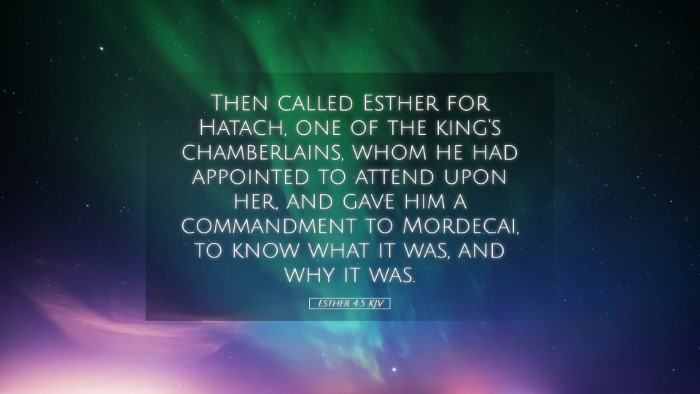Old Testament
Genesis Exodus Leviticus Numbers Deuteronomy Joshua Judges Ruth 1 Samuel 2 Samuel 1 Kings 2 Kings 1 Chronicles 2 Chronicles Ezra Nehemiah Esther Job Psalms Proverbs Ecclesiastes Song of Solomon Isaiah Jeremiah Lamentations Ezekiel Daniel Hosea Joel Amos Obadiah Jonah Micah Nahum Habakkuk Zephaniah Haggai Zechariah MalachiEsther 4:5
Esther 4:5 KJV
Then called Esther for Hatach, one of the king's chamberlains, whom he had appointed to attend upon her, and gave him a commandment to Mordecai, to know what it was, and why it was.
Esther 4:5 Bible Commentary
Bible Commentary on Esther 4:5
Verse Analysis: Esther 4:5 records an important moment in the narrative of Esther. It exemplifies themes of communication, identity, and divine providence. This verse states, “Then called Esther for Hatach, one of the king's chamberlains, whom he had appointed to attend upon her, and gave him a commandment unto Mordecai, to know what it was, and why it was.” This incident marks a pivotal point as Esther responds to Mordecai's distress regarding Haman's decree against the Jews.
Contextual Overview
The Book of Esther details the life of a Jewish woman in exile, who rises to the position of queen in Persia. At this juncture, Esther is confronted with the dire situation facing her people due to a royal edict that threatens their extermination. The significance of Esther 4:5 lies in its demonstration of Esther's willingness to act and her commitment to understanding the full scope of the crisis.
Historical Context
During the Persian Empire, Jewish exiles had limited power and faced the constant threat of genocide. Haman's plot to destroy the Jews represents the pinnacle of this threat, underlining the vulnerability of God's chosen people in a foreign land. Esther's position as queen gives her an unprecedented opportunity to influence the fate of her people.
Insights from Public Domain Commentaries
Matthew Henry's Commentary
Matthew Henry emphasizes Esther's proactive approach in the face of crisis. He observes that Esther, despite her elevated status, remains connected to her roots—represented by her relationship with Mordecai. Henry points out that she sends Hatach, a trusted aide, to Mordecai to grasp the details of the situation. This indicates Esther's desire for clarity before taking significant actions. Henry asserts, “When God's people are in trouble, they should not remain idle; they ought to inquire into their state.” Esther’s actions symbolize a form of intercession, showcasing her responsibility towards her people.
Albert Barnes' Commentary
Albert Barnes elaborates on the choice of Hatach as Esther's messenger. He notes that the king's chamberlains were trusted individuals within the court, and sending such a person to Mordecai indicates the seriousness with which Esther approached the situation. Barnes highlights that Esther's inquiry reflects her wisdom, advocating for the need to understand the full implications of the distress she heard about. He writes, “It is always wise to know the whole case before taking advice, or acting in a crisis.” The verse also illustrates Esther's courage since she risks her position in order to learn about a potential threat to her people.
Adam Clarke's Commentary
Adam Clarke focuses on the relational dynamics between Esther and Mordecai. He observes that despite her royal position, Esther maintains a strong bond with her cousin, emphasizing familial loyalty. Clarke notes that Esther's call for Hatach to find out the cause of Mordecai's mourning portrays her compassion and willingness to engage with his concerns. He asserts that her actions demonstrate the importance of prayerfully considering serious matters. Clarke also points out the significance of the messenger, considering how God works through ordinary circumstances and people to fulfill His purposes.
Theological Implications
The passage holds profound theological implications. It illustrates God’s providence as Esther begins to recognize her role in the divine plan for her people. The act of seeking information highlights the importance of discernment and understanding in fulfilling God’s will. This resonates deeply with both leaders and believers, as decisions made without adequate understanding can lead to dire consequences.
Lessons for Leadership
- The Importance of Communication: Esther’s choice to send Hatach indicates the necessity of effective communication in leadership. Leaders must ensure they are informed and understand the situations fully before making decisions.
- Being Attentive to the Needs of Others: Esther demonstrates empathy towards her people, which is a critical trait for any leader.
- The Role of Counsel: Committed leaders seek wise counsel and advice, as Esther did by turning to Mordecai.
Application to Modern Life
The themes found in Esther 4:5 resonate with today’s challenges. In a world marked by crises, the ability to respond with informed action is essential. Believers are called to seek understanding of their circumstances and the needs of their communities, just as Esther did. This reinforces the value of relationships, accountability, and the necessity of prayer in discerning God’s will.
Call for Action
In reflecting upon Esther's response, modern followers of Christ are encouraged to be vigilant. Whether in individual lives or within church communities, active engagement in understanding issues and needs is paramount. Leaders are encouraged to foster communication lines that promote transparency and support.
Conclusion
Esther 4:5 stands as a powerful reminder of the interplay between action and understanding in the lives of God’s people. The insights gleaned from Matthew Henry, Albert Barnes, and Adam Clarke paint a rich tapestry of wisdom about leadership, discipleship, and the necessity of discernment in the face of adversity. As we navigate our own challenges, may we embody Esther’s resolve to seek, understand, and act for the sake of others.


